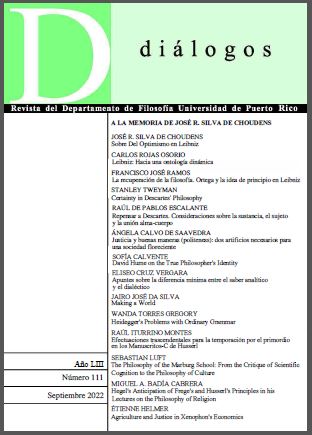Abstract
While Descartes defends the real distinction between soul and body, he characterizes human beings as the union of both. The so-called Cartesian dualism neglects the relationship between the soul and the body in human beings and overlooks that the term substance in Descartes is not used univocally. In dialogue with É. Balibar and J. Cottingham, the complexity of this notion and its relationship to that of attribute will be highlighted. Following the common thread of this problem, this article highlights thatin Descartes, human beings as such are not considered as substances. What is described is the union as substantial, a union that depends on other substances without itself being one. To conclude that human life is not a substance-thing paves the way to considerations about human beings that cannot be reduced to a self-grounded subjectivity

This work is licensed under a Creative Commons Attribution-NonCommercial 4.0 International License.

